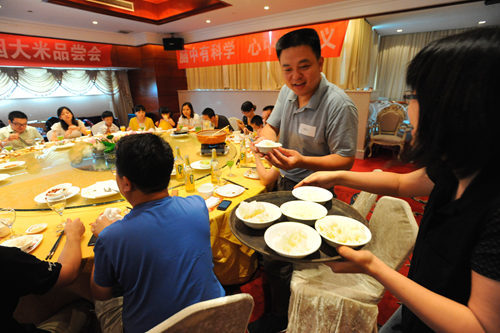To eat, or not
Updated: 2013-10-02 10:50
(bjreview.com)
|
|||||||||||
Genetically modified foods are gaining ground in China, but public skepticism remains
Every year, Wang Xiuqiong defies a particular norm in the name of tradition: She makes her own moon cakes. As summer comes to a close, supermarkets and other shops around China quickly fill up with the Chinese pastry around the Mid-Autumn Festival, which fell on September 19 this year. The holiday food is a popular gift for friends, family and colleagues.
|
 Give it a whirl: Patrons at a restaurant sample genetically modified rice in Hangzhou, Capital of east China's Zhejiang province, on July 14, 2013. [Photo / CFP]
|
But keeping with tradition can prove difficult, as Wang, a native of Beijing, soon found out. Soybean oil is Wang's secret ingredient in her moon cakes, but this year she learned that most soybean oil sold in supermarkets is genetically modified. For Wang, that's a big no-no. The supermarket near her home used to have a shelf dedicated to non-GM soybean oil, but the shelf was removed several months ago. A clerk at the supermarket told Wang it's almost impossible to find non-GM soybean oil suppliers. Wang ended up using sunflower seed oil to make moon cakes this year, fearing health hazards from using GM soybean oil.
Wu Mei, an official in charge of data collection at the Beijing Municipal Bureau of Statistics, said it's quite hard to buy non-GM soybean oil in big cities, as only small oil manufacturing factories in rural areas produce it. "Over 90 percent of the soybean oil for sale in Beijing is genetically modified," she said.
Related Stories
GM foods make its way to China market 2013-09-29 09:59
GM food influx a dilemma for consumers, farmers 2013-06-20 11:00
Hunan denies kids used in GM food test 2012-09-03 01:25
Draft law on GM food online to solicit comments 2012-02-23 13:31
Today's Top News
Search for fishermen continues
Impasse in Congress shuts down services
Market in antiques booms in Shanghai
Leaders study at 'Silicon Valley'
Manufacturing shows positive growth
Beijing to issue air quality warnings
China committed to deepening reform
China's railways see record traffic
Hot Topics
Lunar probe , China growth forecasts, Emission rules get tougher, China seen through 'colored lens', International board,
Editor's Picks

|

|

|

|

|

|





